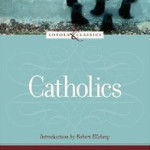Book Review by Victoria Ryan
 Catholics by Brian (pronounced BREE ann) Moore (1972) is a quick read – a thin book with few characters, simple dialogue, and a straight forward plot. But there is nothing thin, simple, or straight about it.
Catholics by Brian (pronounced BREE ann) Moore (1972) is a quick read – a thin book with few characters, simple dialogue, and a straight forward plot. But there is nothing thin, simple, or straight about it.
The novel opens with polarity. Location: Muck Island Abbey, founded in the year 1216. Time: “in the near future after a fictional Vatican Council IV.” James Kinsella, American priest, arrives by supersonic jet then helicopter at Muck Abbey on the coast of Ireland (a country nearly synonymous with traditional Catholic values). He is on assignment by command of his superior, father general (lower case intentional), to deliver a letter to abbot Tom?s O’Malley.
The letter is an ultimatum thinly disguised as a politically correct “request for an explanation.” He wants O’Malley to put an immediate stop to Latin Mass, private confession, clerical dress and other archaic rites that the monks continue to practice in direct disobedience to Rome. The monks have inadvertently attracted a growing number of Catholics from around the world who travel there specifically to participate in the “old ways”- so many Catholics, in fact, that British television is planning widespread coverage of the pilgrimages.
The timing couldn’t be worse for the Church. It has embraced the World Ecumen Council and is just days away from “… possibly the most significant historical event of our century … interpenetration between the Christian and Buddhist faiths…” But the merger will fail if films of the Muck Island pilgrims are aired. The old ways have “been distasteful to other groups within the Ecumen brotherhood (and knowing the rituals are continuing would) be extremely embarrassing for father general at the talks.”
Kinsella is articulate and assured. He is a soldier for the Church, if not for God, more of a priest as occupation than priest as vocation. His focus, as his name implies, is on what he can sell: ecumenism and social justice rather than transcendence and transubstantiation. He is annoyed by the backward thinking of the islanders who insist on calling him Father and by the monks who say the old grace before meals instead of the World Ecumen Council approved prayer.
He is unimpressed by Father Manus who speaks, as his name implies, for man, for the us. “We did nothing to start this… we said the Mass…the way we were brought up to say it… because God was there … in the form of a wafer of bread… the daily miracle … a mystery… this new Mass isn’t a mystery, it’s a mockery, a singsong, it’s not talking to God, it’s talking to your neighbor and that’s why it’s in English, or German…”
In contrast, abbot Tom?s O’Malley, like his namesake apostle, is a doubter. He admits he is “not a holy man” and he does not disagree with Kinsella’s approach to the problem as a business decision. But in the spirit of business (though not of spirituality) he takes his responsibility for the monks seriously, explaining that “it was my duty not to disturb the faith they have. So, I went back to the old way.” Kinsella is quite sure and happy with the path he’s on. The abbot is not. Together they represent a cross-section of today’s Catholic Church.
The story begins with Kinsella’s demand and ends with the abbot’s response. But in-between (and for some readers, long after the book is finished) the thoughtful reader is unexpectedly pulled into the whirlwind of his beliefs or her own doubts. What’s more important, worship of God or service of man? Belief of God-with-us in the Eucharist or acceptance of a symbolic Presence? World peace with one homogenized faith or world unrest with individual creeds? Which side wins? What is lost in the winning?
Catholics is a quick, fun read with delightful vocabulary, tight descriptive writing and characters as individual as the people of whom they remind us. It is a treasure trove for readers who delight in symbolism and authorial motive theories. Is the title a question, a statement, a group, a subgroup? Are the religious who are depicted on the cover walking on the road, straying from the road, or looking back? Is Moore, a Catholic born native of Northern Ireland who reportedly left the Church when he moved to Canada, condemning Catholicism as some reviewers feel? Or are the distinct voices of both the author and narrator suggesting another message?
Although Catholics was a quick read for me, it wasn’t always an easy one. The Introduction, written by Robert Ellsberg and added (along with Questions for Reflection and Discussion) in 2006, is arguably necessary for historical perspective. But it disappointed me with summaries and opinions that I would have preferred to discover on my own (and would not have objected to after the story). Unusual paragraphing distracted my pace and I interpreted it to be an invitation by the author to stop and think. Sentences, too, lost their subjects (not uncommon by any means) but the fact that these stood out suggested a symbolic intrusion as well.
Brian Moore wrote Catholics in 1972 when the top half of the baby boomer generation, schooled at least in part in the old ways, was entering adulthood. Yet it remains highly relevant for Catholics today – especially those cognizant of a small but persistent movement to return to pre-Vatican II rituals and theology. It is timeless for anyone who asks: is life about God and the world, or God in the world?